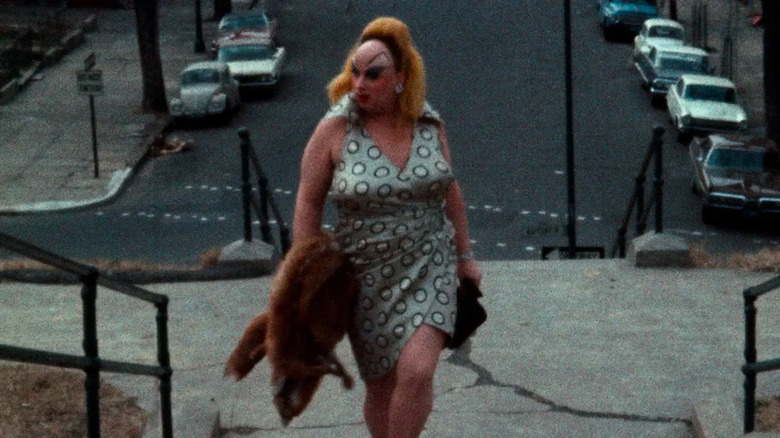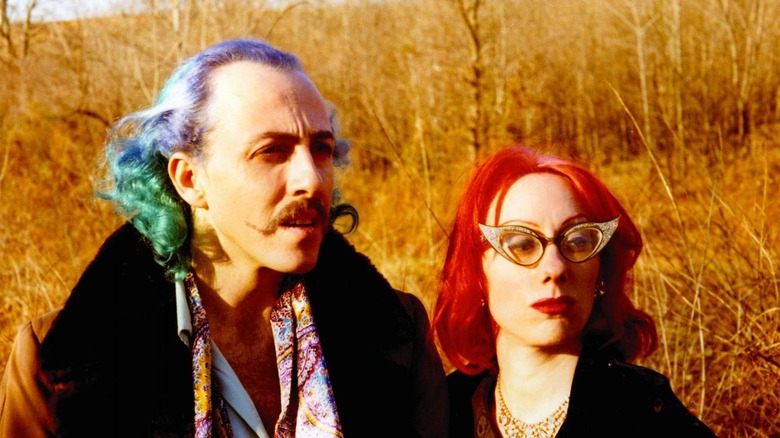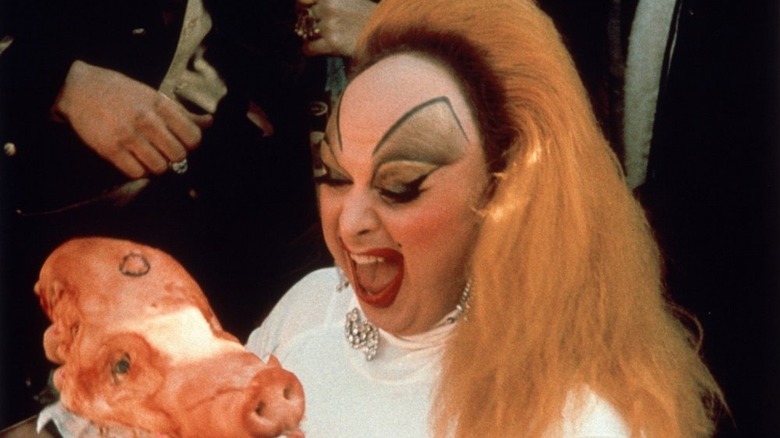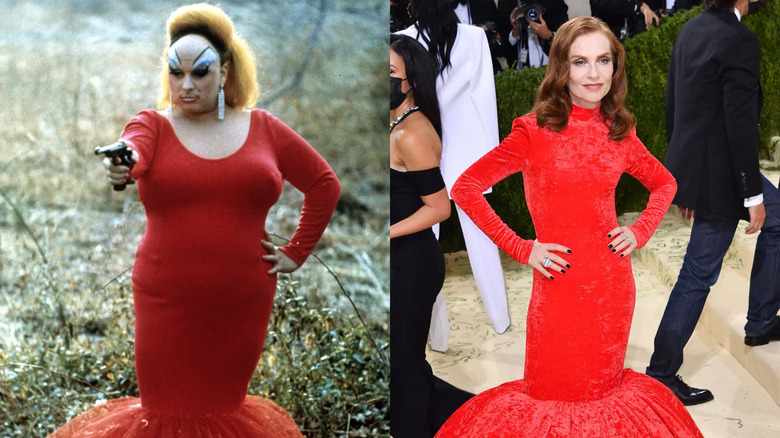Pink Flamingos Controversy Explained
50 years ago, a game-changing film made its world premiere in Baltimore. It was the tale of a criminal family struggling to save their legacy from their covetous rivals, and audiences were shocked by execution-style violence and the surprise appearance of a severed animal head. No, not "The Godfather" — but John Waters' "Pink Flamingos."
Like Francis Ford Coppola's gangster epic, "Pink Flamingos" touches upon themes of family, honor, loyalty, and revenge. It also has a scene with a woman eating fresh dog s**t. Both films premiered a few days apart, and each changed cinema in their way. "The Godfather" set a new high standard for mob sagas by which everything else would be measured; "Pink Flamingos" pushed the boundaries of what was acceptable, paving the way for gross-out comedies to this day. As Scott McDonald wrote in Artforum:
Its most important function is to catalyze other, more far-reaching experiences, the most interesting of which may be the undermining of viewers' willingness and ability to accept wimpy Hollywood fabrications at face value.
While the "Jackass" gang have taken pooping and puking for laughs into the mainstream, "Pink Flamingos" still feels dangerous, a home movie from the lunatic fringe, populated by grungy geeks and weirdos gleefully debasing themselves to shake up the squares. Many have tried to out-do it since, but John Waters' film remains the ground zero of gross.
While it retains its outsider edge, "Pink Flamingos" has gained some sort of respectability over the years. It joined "The Godfather" on the National Film Registry and even went one better, becoming part of the Criterion collection while Coppola's masterpiece is still waiting. That said, there are parts of the U.S. where "Pink Flamingos" still isn't welcome, a hangover from its controversial release half a century ago.
So what happens in Pink Flamingos again?
Divine, aka Babs Johnson, is a wanted criminal crowned the "filthiest person alive" by the tabloids. She's hiding out in a battered trailer somewhere in the Maryland boondocks with her egg-obsessed mother Edie (Edith Massey), chicken-loving son Crackers (Danny Mills), and her relatively normal girlfriend Cotton (Mary Vivian Pierce).
All is well until a wealthy pair of "jealous perverts," Raymond and Connie Marble (David Lochary and Mink Stole), become enraged by Divine's media attention and decide to challenge for her title. They definitely have the credentials, making their money by kidnapping young women for impregnation by their butler so they can sell the babies on the black market, and running an inner city drug ring targeting elementary schools. Just for kicks, Raymond also likes exposing himself to women in the park with a sausage tied to his junk.
Battle lines are drawn when the Marbles send Divine a turd for her birthday. She retaliates by breaking into their house and licking all their stuff. As the conflict escalates, who will truly prove themselves the filthiest?
It's a great set up and still has the power to shock and disgust, but the thing that struck me (other than one regrettable incident involving a luckless chicken) is how good-natured it all is while skewering some of the worst aspects of American culture. John Waters wrote "Pink Flamingos" after attending the Manson Family trials and joyously left no taboo un-shattered, fully earning his title "The Pope of Trash." He later wrote, with typical drollery:
"To me, bad taste is what entertainment is all about. If someone vomits while watching one of my films, it's like getting a standing ovation."
What was so controversial about Pink Flamingos?
The plot of "Pink Flamingos" is basically an excuse for a string of gross-out set pieces. A few of the "highlights" include the previously mentioned chicken getting squashed during a vigorous sex session between Crackers and his date; a man artificially inseminating a woman after masturbating into a cupped palm; a man singing with his anus; and Divine explicitly fellating her on-screen son. The film ends with a vile coup de grâce as Divine scoops up some freshly dropped dog dirt and eats it.
Waters and his Dreamland troupe had some trouble with the law previously, arrested for conspiracy to commit indecent exposure during the filming of "Mondo Trasho." The cavalcade of grossness in "Pink Flamingos" also landed the director in court on obscenity charges (via Entertainment Weekly):
"I never won [obscenity cases] because at midnight, "Pink Flamingos" is joyous, it's exciting, the audience love it. But if you're sworn in on jury duty in a courthouse, sitting there next to a stranger, watching a singing a**hole at 7:30 in the morning, I promise you, it is obscene. It's all about geography. I would just plead guilty, which was a $1,000 fine, and the lawyers usually cost more than that."
Even 50 years later, Waters is careful to avoid a certain town:
"Still, in Hicksville, New York, on Long Island, technically, if they ever show "Pink Flamingos," Bob Shaye, the head of New Line, and I can go to prison, because we signed a thing saying, if it ever played there we would go to prison. And I do believe Pink Flamingos may have played in Hicksville. I don't know if I'm wanted by the police, but I never drive by that town in case."
Did the controversy hurt Pink Flamingos?
Not one bit. Waters cannily positioned the excrement chow-down as a publicity stunt to drive people to the theaters (via Artforum):
"I had to get people's attention some way. I figured if I did that, no one would ever be able to forget it, and that it would be a first and last in film history. It was the first idea I had for the whole movie. I had $10,000 and I knew I had to compete with regular movies. You have to go way out on a limb and give 'em something that the studios would never want to give them."
The stunt worked, and "Pink Flamingos" made $7 million at the box office against its tiny budget, a cash loan from Waters parents who, he maintains, never saw the movie. The film was banned at first in some countries and territories, only receiving a later release with the maximum-strength classifications. Restrictive ratings couldn't stop the popular appeal of the film, which became a midnight movie staple.
John Waters' career went from strength to strength, completing his "Trash trilogy" with "Female Trouble" and "Desperate Living" before moving onto slightly more mainstream fare in the '80s and '90s. Nowadays, he's regarded as one of the most important LGBTQ+ directors. Divine, aka Harris Glenn Milstead, played a part in most of the director's films, becoming a true cult icon and named "Drag Queen of the Century" by People Magazine when he passed away in 1988 (via Them). His influence continues well into the 21st century: a whole episode of "RuPaul's Drag Race" was devoted to his unforgettable look, and the eternally elegant Isabelle Huppert wore a "Pink Flamingos" inspired Balenciaga dress to the Met Gala last year (via Vogue).
Does Pink Flamingos still hold up?
That's a tricky one. "Pink Flamingos" is arguably as popular as ever, but it's a tough watch. Viewers who haven't seen it yet, or a John Waters film in general, it is worth approaching with a little caution. Some of his later movies like "Hairspray" or "Serial Mom" would make a safer entry point to his filmography.
As a piece of filmmaking, it is incredibly coarse. It cost only $12,000 and looks like Waters spent a lot less, with squalid locations, shaky home movie-style camerawork, and performances that are amateur at best. The one exception is Divine who completely dominates the film, flinging himself at every outrageous travesty with fiery, unapologetic gusto. On the flip side, low production value gives "Pink Flamingos" a sense of authenticity that far more costly films rarely manage.
Roger Ebert, reviewing the film for its 25th anniversary, declined to rate the film, stating:
"I am not giving a star rating to "Pink Flamingos," because stars simply seem not to apply. It should be considered not as a film but as a fact, or perhaps as an object."
That was a bit rich coming from the guy who co-wrote "Beneath the Valley of the Ultra-vixens," but then Ebert sometimes had a blindspot for films with cult appeal (see also: "Blue Velvet"). "Pink Flamingos" might be crude, but it has a serviceable narrative no worse than the Farrelly Brothers use as a clothes horse for their gross gags, and it's an effective satire of trash culture that anticipated Jerry Springer, "Natural Born Killers," and today's obsession with real lives and true crime. Waters may have become the "Pope of Trash," but perhaps the "Prophet of Trash" might have been more appropriate.




